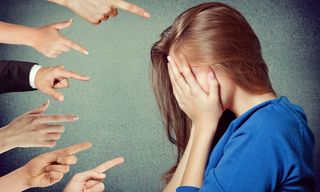Suicide
Why We Need a Kinder Society
Less judgment and more support for those who are in the spotlight.
Posted February 19, 2020 Reviewed by Gary Drevitch

Society includes a very much mixed bag of people. There are countless people who will go out of their way to help others without asking for anything in return. Similarly, there are those who are simply unkind, judgmental, and even abusive to others. Modern society is filled with technology which can now apply hatred and abuse at an unprecedented level. We live in a world of social media, where bullying just doesn’t happen on the playground, but it continues behind the closed doors of the homes of those most venerable.
Many of us have experienced some form of abuse, whether it was a single occasion, multiple times, or more group orientated and consistent bullying. Those who have experienced this know firsthand how impactful it is to mental health, with scars present for many years or even the rest of our lives. Indeed, there is a lot of supportive evidence linking bullying or victimization with suicidal ideation, and this includes cyber bullying1.
The World Health Organization predicts that approximately 1.53 million people will die from suicide in 2020, with one suicide predicted every 20 seconds2. The growing integration of social media in our lives can only magnify the damage caused by trolls and those who wish to judge.
The recent sad news of the passing of presenter Caroline Flack in the UK is just one example of how society has neglected its responsibility to support those most in need. Celebrity focus is perhaps the most intense spotlight in society. Perhaps an overintrusive media, and online trolls who feel better after causing abuse, may have little sympathy for someone who is struggling and the results that follow.
There are countless other examples. Australian model and reality star Charlotte Dawson committed suicide in 2014, largely attributed to online trolls. Love Island’s Sophie Gradon had spoken openly about trolls—"Trolls leave you feeling vulnerable, unsafe, and upset”—before committing suicide herself in 2019.
There is a saying, "Hurt people hurt people," and this may have some substance. In a world that celebrates glitz and glamour, there may be little room for the acknowledgment of pain. Superficial TV ratings, and social media likes and followers, may overshadow the need for help.
A world where we may feel that celebrities are there for our entertainment 24 hours a day, because, well, they are in the entertainment business, may be unkind. Greater awareness, kindness, and sympathy is needed.
In psychology, there is an exercise called perspective taking, in which we try to take the perspective of another, to walk in the shoes of that person and feel what their life may have felt like. This helps us appreciate the person's experiences, and has shown to increase empathy towards that person even in cases where we do not know the person3. To most people, to imagine and feel Caroline’s, Charlotte’s or Sophie’s last day, in their shoes, would bring sadness and pain.
Perhaps, therefore, we should be more mindful that everyone can hurt, and that everyone can feel pain. We are, after all, only human. Perhaps greater awareness is needed that celebrities, like all people, will only show you—a stranger—a persona they want you to see, and not necessarily their struggles, fear, or pain. Their lives cannot be our circus 24 hours a day. In a world where we can be anything, be kind.
References
Hinduja, S., & Patchin, J. W. (2010). Bullying, cyberbullying, and suicide. Archives of suicide research, 14(3), 206-221.
Gvion, Y., & Apter, A. (2012). Suicide and suicidal behavior. Public health reviews, 34(2), 9
Healey, M. L., & Grossman, M. (2018). Cognitive and affective perspective-taking: evidence for shared and dissociable anatomical substrates. Front Neurol, 9, 491.


